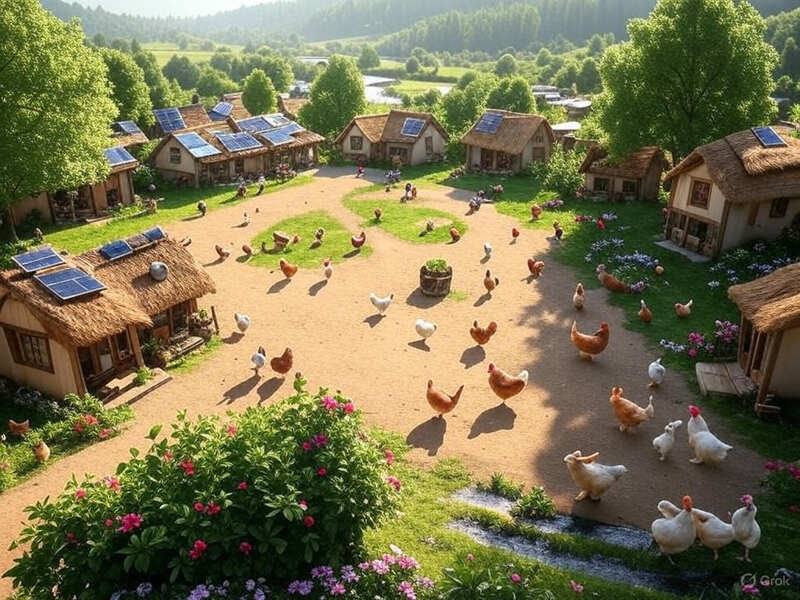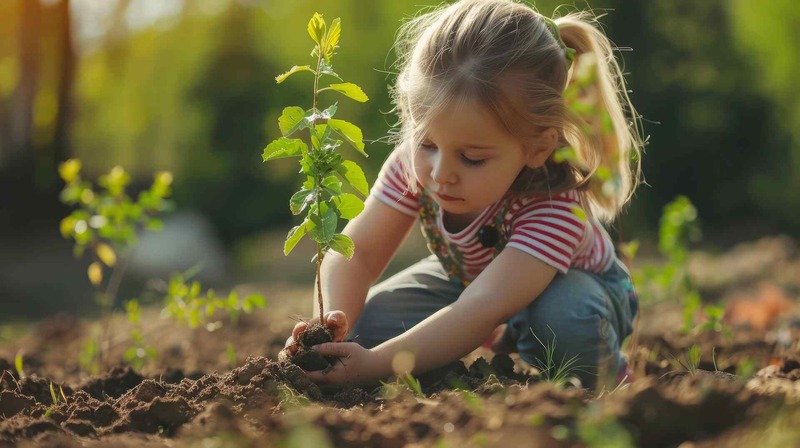Eco-village living—a sustainable and connected way of life—is super popular. A lifestyle in harmony with nature, and a way to reduce our environmental footprint. But what exactly is an eco-village, and can it provide a meaningful lifestyle where you can live authentically, build real relationships, and align with your values?
Imagine a peaceful, sustainable village with shared gardens, renewable energy sources, and a tight-knit community where everyone plays a part. But is it really as idyllic as it sounds? Let’s explore the pros and cons of eco-village living based on real-world examples and experiences from those who have embraced this lifestyle.
Table of Contents
What is an Eco-Village?
An eco-village is a community designed with sustainability and shared responsibility at its core. Whether it’s an off-the-grid project, an eco-village resort, or a rural farm-based model, eco-villages focus on caring for the environment while promoting social interaction and cooperative living. These communities use natural building techniques, renewable energy sources, and organic food production. The aim is not just to build a sustainable home, but to create an environment that supports both human and planetary well-being.
Eco-villages vary widely—some are small and focused on eco-living in rural areas, while others may have a more resort-like atmosphere. There are also eco-village projects that are actively looking for members who want to join or help build the community. Whether it’s a model for sustainable living or an established village, the core principle remains the same: creating a life that aligns with nature.
Eco-Village Living: A Day of Rhythm, Connection, Sustainability, and Purpose
Morning: The day starts early in an eco-village, with the natural world waking up around you. You might gather with others for a communal breakfast, featuring fresh, organic produce grown by the community. The morning sets the tone for the day—peaceful, intentional, and connected to the land.
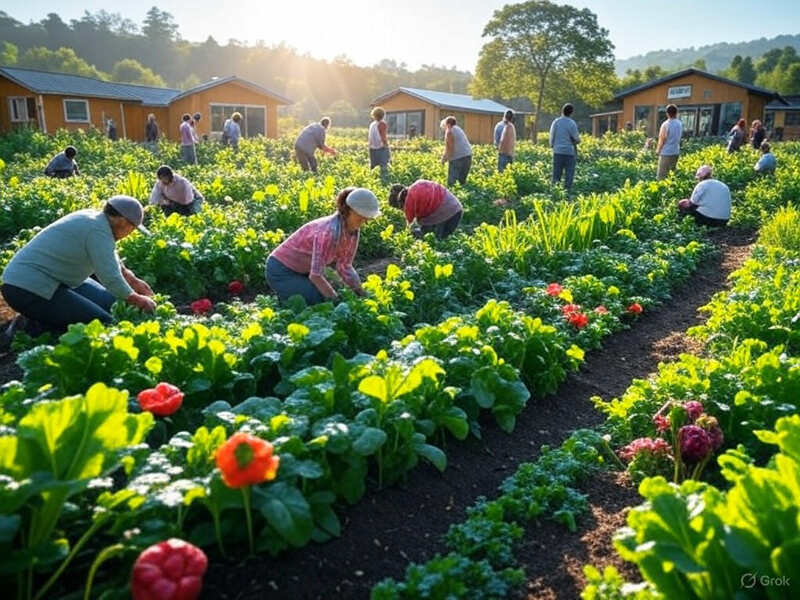
Mid-Morning: After breakfast, community members engage in tasks like gardening, renewable energy maintenance, or building. Everyone plays their part, contributing to the collective good while creating a sustainable environment.
Afternoon: Afternoons are for personal projects or group collaboration. You may focus on your personal interests or join others in planning community events or workshops.
Evening: As the sun sets, there’s often a communal dinner and a time for connection—whether through storytelling, music, or group discussions about the future of the eco-village. The day ends with a sense of fulfillment and calm, knowing that you’ve contributed to a meaningful, sustainable life.
What Kind of People are choosing Eco-Village Living?
Eco-village living attracts a wide variety of people, but there are some common threads among its members. People who live in eco-villages are often drawn to sustainability, cooperation, and community building. They are typically open-minded, self-sufficient, and committed to reducing their environmental impact.
In eco-villages, you’ll find individuals and families with diverse backgrounds—artists, environmentalists, farmers, retirees, and young professionals—all living together with a shared vision for a sustainable future. Whether it’s an eco-village looking for members to help create something new or a more established one, the common thread is the desire to live authentically in connection with nature and with others.
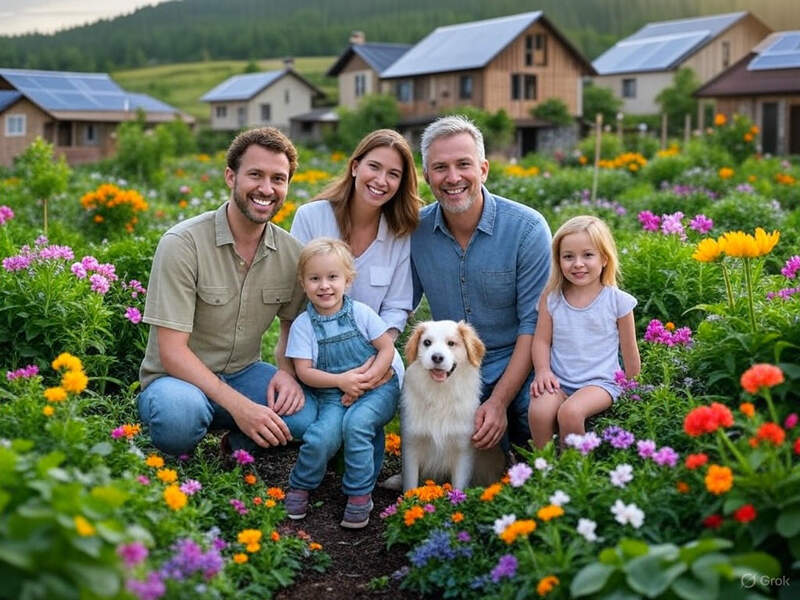
The Pros of Eco-Village Living
Connection and Belonging
One of the greatest benefits of eco-village living is the sense of connection it provides. In these communities, you’re living with people who share your values of sustainability, creativity, and authenticity. This sense of shared purpose creates deep, lasting connections and a feeling of belonging. Whether you’re part of an eco-village near you or exploring examples from around the world, the bond between members is key to creating a harmonious environment.
Shared Resources and Sustainable Living
Eco-villages thrive on the principle of sharing resources—whether it’s food, tools, or even living spaces. This reduces individual costs and minimises consumption. Eco-village models often prioritise local food production, renewable energy, and eco-friendly construction methods. The community works together to reduce its environmental impact while living in a way that aligns with their values of sustainability.
3. Building Authentic Relationships
Living in an eco-village means engaging with others on a deeper level. The collaborative nature of the lifestyle fosters authentic, meaningful relationships. You’re not just living next to people; you’re sharing experiences, working together, and supporting each other in your personal journeys. These connections go beyond the surface and create a foundation of trust and community.
4. Contribution to a Collective Purpose
In an eco-village, everyone plays an essential role. Whether it’s managing gardens, organising community events, or maintaining the village infrastructure, the collective effort creates a sense of pride and accomplishment. Being part of something bigger than yourself—a sustainable, intentional community—is incredibly fulfilling.
The Cons of Eco-Village Living
Compromise and Cooperation
As with any community living, eco-village living requires compromise. Differences in values, work ethics, or personal habits will arise. The key to thriving in an eco-village is a willingness to communicate openly, collaborate, and sometimes sacrifice individual preferences for the good of the group.
Privacy Concerns
Eco-villages often involve shared living spaces, which means privacy can be limited. If you’re someone who enjoys solitude or values personal space, this could be a challenge. However, the close-knit nature of eco-villages can also be an opportunity for growth and connection, offering an environment that encourages social interaction and mutual support.
Collective Responsibility
Living in an eco-village means contributing to the community’s upkeep. This includes maintaining communal areas, taking care of gardens, and participating in group decision-making. While this sense of collective responsibility is part of the appeal for many, it can also be demanding for those who prefer a more independent lifestyle.
Idealism vs. Reality
Though eco-village living offers a utopian vision of sustainability and harmony, the reality can be more complex. It’s not always easy to manage group dynamics, and conflicts or differences in expectations can arise. Being part of an eco-village requires realistic expectations, patience, and a readiness to navigate these challenges.
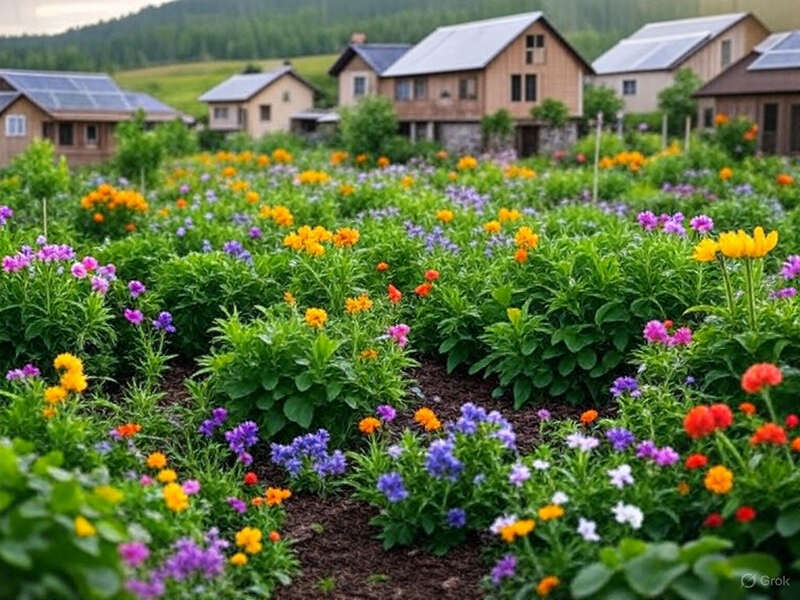
You might Love to Check some Examples of Eco-Village Living Worldwide
Findhorn Eco-Village, Scotland
Located in the northern Highlands of Scotland, Findhorn is one of the most renowned eco-villages in the world. Founded in the 1960s, it has grown into a thriving community dedicated to sustainability, spiritual living, and environmental stewardship. Findhorn operates on principles of organic gardening, renewable energy, and collective decision-making. The community hosts workshops, educational programs, and events that attract people from all over the world to learn about sustainable living.
Key Features:
- Ecological buildings made with sustainable materials.
- Renewable energy systems (solar and wind power).
- Emphasis on community, cooperation, and spiritual growth.
Auroville, India
Auroville, located in Tamil Nadu, India, is an ambitious eco-village project founded in 1968. Its mission is to be a universal town where people of all nationalities, faiths, and cultures can live together in harmony. Auroville is deeply committed to sustainable living and ecological restoration. The community has developed its own organic farming systems, water management projects, and renewable energy initiatives.
Key Features:
- Over 50 years of commitment to sustainable development.
- A vast array of green initiatives, including organic farming, tree planting, and renewable energy projects.
- A place of learning and transformation, with a focus on spiritual and environmental consciousness.
The Farm, Tennessee, USA
Founded in 1971, The Farm is one of the largest and oldest eco-villages in the United States. Located in Summertown, Tennessee, it’s a rural community that focuses on sustainable living through organic farming, renewable energy, and social equity. The Farm has also been involved in cooperative business practices and is known for its emphasis on education, sustainable agriculture, and community-building.
Key Features:
- Extensive organic farming and educational programs.
- Renewable energy use (solar and wind).
- A focus on social justice, cooperation, and sustainable agriculture.
Tamera, Portugal
Tamera, located in the southern part of Portugal, is a well-established eco-village that integrates ecological sustainability with spiritual practices. Founded in 1995, Tamera focuses on creating a model for a future society based on love, healing, and ecological balance. It operates as a research center for new ways of living, and its members work to restore the local environment and create a peaceful and supportive community.
Key Features:
- A strong focus on ecological regeneration and peace-building.
- Energy-efficient buildings and organic agriculture.
- Education on sustainable living, peace, and social transformation.
Los Angeles Eco-Village, USA
Located in the heart of Los Angeles, the Los Angeles Eco-Village is an urban model for sustainable living. It blends the benefits of city living with the principles of sustainable, community-oriented living. The eco-village promotes energy efficiency, water conservation, and urban agriculture, aiming to be a “green oasis” within the bustling city. It also serves as an educational hub, offering workshops on sustainability, green building, and community living.
Key Features:
- Urban agriculture and gardening.
- Sustainable building and energy-efficient homes.
- Community-centered projects that focus on social and environmental justice.
Damanhur, Italy
Damanhur is a unique eco-village located in the Italian Alps, blending community living with spiritual exploration. Founded in 1975, Damanhur focuses on sustainability, cultural preservation, and creating a “community of the future.” It’s also home to a remarkable underground temple, and the village operates on principles of shared responsibility and spiritual growth. The eco-village has its own organic farm, renewable energy systems, and collective decision-making processes.
Key Features:
- Sustainable farming and renewable energy systems.
- Spirituality and artistic expression are central to the community.
- A focus on innovation and preserving cultural heritage.
ZEGG, Germany
ZEGG (Zentrum für Experimentelle Gesellschaftsgestaltung) is an eco-village located in Germany, focusing on social, ecological, and personal transformation. Established in 1991, ZEGG is built on the principles of ecological sustainability, social responsibility, and emotional healing. The community operates as a social experiment, where residents live with a focus on openness, love, and collective well-being.
Key Features:
- Eco-friendly buildings and renewable energy systems.
- A strong emphasis on emotional openness and communication.
- Sustainable farming practices and organic food production.
How do you feel about Eco-Village Living, could that be Your Future Lifestyle?
Reflecting on the pros and cons of eco-village living, you can now ask yourself whether this lifestyle aligns with your vision of your future lifestyle. If you seek deeper connections, a more sustainable way of life, and a chance to contribute to something meaningful, eco-village living could be a perfect fit. It offers a unique opportunity to live authentically, reduce your environmental footprint, and build lasting relationships.
However, if you highly value privacy, independence, and flexibility, eco-village living may require more adjustment. As always, the decision is deeply personal, and it’s important to carefully consider whether the communal lifestyle aligns with your desires and needs.
Ultimately, I’d say eco-village living offers a fulfilling way of life—one that’s grounded in sustainability, connection, and authenticity. It’s not for everyone, but for those who resonate with its values, it offers a chance to live in harmony with the Earth and others, creating a life filled with purpose and meaning.
FAQs about Eco-Village Living
Do I need to be self-sufficient for eco-village living?
While self-sufficiency is a core value, most eco-villages promote collaboration. Residents typically contribute to shared tasks like farming, maintenance, and sustainability efforts, but you don’t need to be fully self-sufficient to join.
How does eco-village living contribute to sustainability?
Eco-villages use eco-friendly building materials, renewable energy sources, and sustainable farming techniques to minimize their environmental impact and reduce waste. They often have systems in place for collective gardening, composting, and water management.
Can I visit an eco-village before committing to live there?
Many eco-villages offer tours, short stays, or volunteer opportunities for prospective residents. This allows you to experience the eco-village living style and see if it aligns with your values before making a long-term commitment.

